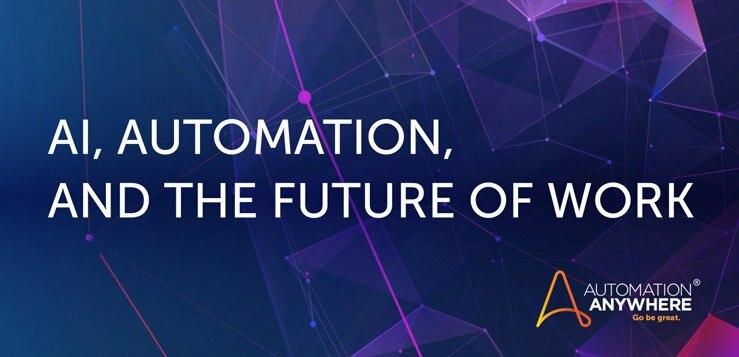Blog
AI, Automation & the Future of Work
Share this:
Navigate to content

Automation, strengthened by artificial intelligence (AI) and data analysis, is transforming every organization and industry globally. While operational efficiency is a key driver, the benefits of automation are far greater than just cost savings.
Whether improving product and service quality, increasing customer satisfaction, enhancing the quality of work for employees, or mining growing volumes of data for insights, automation is being adopted faster than ever before, which is the future of work.
Taking the robot out of the human
Gartner predicts that by 2020, 40% of large enterprises will have adopted Robotic Process Automation (RPA), up from less than 10% today. McKinsey & Company's research found that automating the human resources onboarding process cut the cost by 80% and shrunk onboarding time.
Research from the London School of Economics suggests businesses can realize more than 600% in return on investment (ROI) from automation by making business processes more efficient and cost-effective — while also enhancing the quality of human work.
Today, we spend about 10% to 20% of our time on mundane, repetitive tasks that can be easily automated. With RPA, you can offload these cumbersome tasks to a Digital Workforce, giving human workers more time to be productive and work on creative projects.
According to Forbes, automation will save employees six to nine weeks of effort each year, saving businesses $4 million annually. This recovered time can be reinvested into career development and personal growth opportunities, making work more human.
However, driving the adoption of RPA enterprisewide can be time-consuming.
Scaling automation enterprisewide
Although more and more companies are adopting intelligent automation, they're unable to expand their automation footprint fast enough. According to another McKinsey study, "About 60% of all occupations have at least 30% of activities that are technically automatable, based on currently demonstrated technologies." A Deloitte report suggests only 3% of large enterprises today have more than 50 bots in production.
One of the primary reasons is that automation projects are currently structured around critical tasks and tactical process implementations. Scaling RPA organization-wide involves identifying a cross-functional team to map business processes and deploying developers to build bots. Complex business processes can take several months to automate, slowing the realization of ROI from automation.
What if your organization could better align automation initiatives around human roles rather than business processes or tasks? What if prepackaged, human-centric automation functionality could be crowdsourced and deployed from an ecosystem of process and automation experts through an online marketplace?
Automation Anywhere can help make both of those ideas a reality for your organization.
The answers to those questions, as well as many more, are addressed in our on-demand webinar, Meet the New Digital Worker.
Meet the new
Digital Worker.
About Suhasini Gadam
Suhasini Gadam, a strategist, analyst, and thought leader, is product marketing manager of Bot Store. She's driven to solve complex problems with simple solutions.
Subscribe via EmailView All Posts LinkedIn






